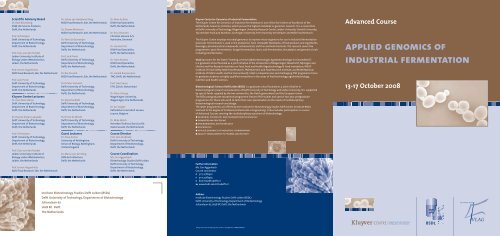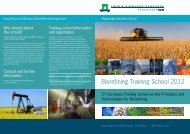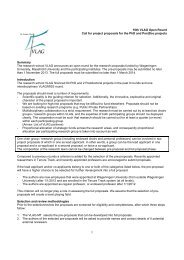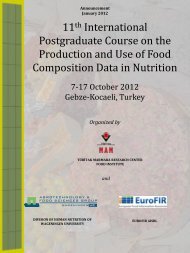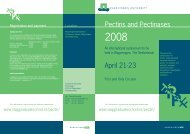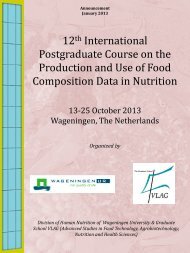Applied Genomics of Industrial Fermentation - Graduate School VLAG
Applied Genomics of Industrial Fermentation - Graduate School VLAG
Applied Genomics of Industrial Fermentation - Graduate School VLAG
- No tags were found...
Create successful ePaper yourself
Turn your PDF publications into a flip-book with our unique Google optimized e-Paper software.
Scientific Advisory Board<br />
Dr. Roel Bovenberg<br />
DSM Life Science Products,<br />
Delft, the Netherlands<br />
Pr<strong>of</strong>. Sef Heijnen<br />
Delft University <strong>of</strong> Technology,<br />
Department <strong>of</strong> Biotechnology,<br />
Delft, the Netherlands<br />
Pr<strong>of</strong>. Cees van den Hondel<br />
Leiden University, Institute <strong>of</strong><br />
Biology Leiden/Metabolomics,<br />
Leiden, the Netherlands<br />
Pr<strong>of</strong>. Jeroen Hugenholtz<br />
NIZO Food Research, Ede, the Netherlands<br />
Pr<strong>of</strong>. Jack Pronk<br />
Delft University <strong>of</strong> Technology,<br />
Department <strong>of</strong> Biotechnology,<br />
Delft, the Netherlands<br />
Kluyver Centre Lecturers<br />
Dr. Jean-Marc Daran<br />
Delft University <strong>of</strong> Technology,<br />
Department <strong>of</strong> Biotechnology,<br />
Delft, the Netherlands<br />
Dr. Pascale Daran-Lapujade<br />
Delft University <strong>of</strong> Technology,<br />
Department <strong>of</strong> Biotechnology,<br />
Delft, the Netherlands<br />
Pr<strong>of</strong>. Sef Heijnen<br />
Delft University <strong>of</strong> Technology,<br />
Department <strong>of</strong> Biotechnology,<br />
Delft, the Netherlands<br />
Pr<strong>of</strong>. Cees van den Hondel<br />
Leiden University, Institute <strong>of</strong><br />
Biology Leiden/Metabolomics,<br />
Leiden, the Netherlands<br />
Pr<strong>of</strong>. Jeroen Hugenholtz<br />
NIZO Food Research, Ede, the Netherlands<br />
Dr. Johan van Hylckama Vlieg<br />
NIZO Food Research, Ede, the Netherlands<br />
Dr. Douwe Molenaar<br />
NIZO Food Research, Ede, the Netherlands<br />
Dr. Patricia Osseweijer<br />
Delft University <strong>of</strong> Technology,<br />
Department <strong>of</strong> Biotechnology,<br />
Delft, the Netherlands<br />
Pr<strong>of</strong>. Jack Pronk<br />
Delft University <strong>of</strong> Technology,<br />
Department <strong>of</strong> Biotechnology,<br />
Delft, the Netherlands<br />
Dr. Bas Teusink<br />
NIZO Food Research, Ede, the Netherlands<br />
Pr<strong>of</strong>. Peter Verhaert<br />
Delft University <strong>of</strong> Technology,<br />
Department <strong>of</strong> Biotechnology,<br />
Delft, the Netherlands<br />
Dr. Aljoscha Wahl<br />
Delft University <strong>of</strong> Technology,<br />
Department <strong>of</strong> Biotechnology,<br />
Delft, the Netherlands<br />
Pr<strong>of</strong>. Han de Winde<br />
Delft University <strong>of</strong> Technology,<br />
Department <strong>of</strong> Biotechnology,<br />
Delft, the Netherlands<br />
Guest Lecturers<br />
Dr. Dave Archer<br />
University <strong>of</strong> Nottingham,<br />
<strong>School</strong> <strong>of</strong> Biology, Nottingham,<br />
United Kingdom<br />
Dr. Marco van den Berg<br />
DSM Anti Infectives,<br />
Delft, the Netherlands<br />
Dr. Wim de Boer<br />
DSM Food Specialties,<br />
Delft, the Netherlands<br />
Dr. Eric Johansen<br />
Christian Hansen A/S,<br />
Hørsholm, Denmark<br />
Dr. Herman Pel<br />
DSM Food Specialties,<br />
Delft, the Netherlands<br />
Dr. Hans Roubos<br />
DSM Food Specialties,<br />
Delft, the Netherlands<br />
Dr. Harald Ruijssenaars<br />
TNO, Delft, the Netherlands<br />
Pr<strong>of</strong>. Uwe Sauer<br />
ETH, Zürich, Switzerland<br />
Dr. Peter Schaap<br />
Wageningen University,<br />
Wageningen, the Netherlands<br />
Dr. An Tanghe<br />
Katholieke Universiteit Leuven,<br />
Leuven, Belgium<br />
Dr. Mike Walsh<br />
Heineken Technical Services BV,<br />
Zoeterwoude, the Netherlands<br />
Course Director<br />
Pr<strong>of</strong>. Han de Winde<br />
Delft University <strong>of</strong> Technology,<br />
Department <strong>of</strong> Biotechnology,<br />
Delft, the Netherlands<br />
Course Coordination<br />
Ms. Ger Aggenbach<br />
Biotechnology Studies Delft Leiden,<br />
Delft University <strong>of</strong> Technology,<br />
Department <strong>of</strong> Biotechnology,<br />
Delft, the Netherlands<br />
Kluyver Centre for <strong>Genomics</strong> <strong>of</strong> <strong>Industrial</strong> <strong>Fermentation</strong><br />
The Kluyver Centre for <strong>Genomics</strong> <strong>of</strong> <strong>Industrial</strong> <strong>Fermentation</strong> is one <strong>of</strong> the five Centres <strong>of</strong> Excellence <strong>of</strong> the<br />
Netherlands <strong>Genomics</strong> Initiative, which pursue the highest standards in genomics research. It is a consortium<br />
<strong>of</strong> Delft University <strong>of</strong> Technology, Wageningen University Research Centre, Leiden University, Utrecht University,<br />
Top Institute Food and Nutrition, Groningen University, Free University Amsterdam and NIZO Food Research.<br />
The Kluyver Centre employs microbial genomics to improve micro-organisms for use in industrial fermentation<br />
processes. <strong>Fermentation</strong> is used in the production, from renewable feedstocks, <strong>of</strong> food products and ingredients,<br />
beverages, pharmaceutical compounds, nutraceuticals, and fine and bulk chemicals. The research covers five<br />
programmes: yeast fermentation, fungal fermentation, lactic acid fermentation, biocatalysis and genomics tools<br />
including bioinformatics.<br />
<strong>VLAG</strong> (acronym for the Dutch “Voeding, Levensmiddelentechnologie, Agrobiotechnologie en Gezondheid”)<br />
is a graduate school founded as a joint initiative <strong>of</strong> the Universities <strong>of</strong> Wageningen, Maastricht, Nijmegen and<br />
Utrecht and five Research Institutes on Food, Feed and Health (Agrotechnology & Food Innovations, RIKILT-<br />
Institute <strong>of</strong> Food Safety, NIZO Food Research, TNO Nutrition and Food Research Institute, and RIVM (National<br />
Institute <strong>of</strong> Public Health and the Environment)). <strong>VLAG</strong>'s comprehensive and challenging PhD programme trains<br />
its graduate students as highly qualified researchers in the areas <strong>of</strong> food technology, agrobiotechnology,<br />
nutrition and health sciences.<br />
Biotechnological Sciences Delft Leiden (BSDL) is a graduate school founded as a joint initiative in<br />
biotechnological research and education <strong>of</strong> Delft University <strong>of</strong> Technology and Leiden University. It is supported<br />
by special funds supplied by the two universities, the Dutch government and the European Union.<br />
The BSDL postgraduate educational programme features PhD studies and special two-year postgraduate<br />
programmes for those who wish to tailor their own specialisation to the needs <strong>of</strong> multidisciplinary<br />
biotechnological research and design.<br />
The latter programmes are <strong>of</strong>fered by the Institute for Biotechnology Studies Delft Leiden (Institute BSDL)<br />
and lead to the degree <strong>of</strong> ‘Pr<strong>of</strong>essional Doctorate in Engineering’. It also includes participation in a series<br />
<strong>of</strong> Advanced Courses covering the multidisciplinary spectrum <strong>of</strong> biotechnology:<br />
ó microbial physiology and fermentation technology<br />
ó downstream processing<br />
ó environmental biotechnology<br />
ó biocatalysis<br />
ó applied genomics <strong>of</strong> industrial fermentation<br />
ó quality management in pharma and biotech<br />
Further information<br />
Ms. Ger Aggenbach<br />
Course coordinator<br />
p 31 15 2781922<br />
f 31 15 2782355<br />
e bsdl-edu@tudelft.nl<br />
w www.bsdl-edu.bt.tudelft.nl<br />
Advanced Course<br />
applied genomics <strong>of</strong><br />
industrial fermentation<br />
13-17 October 2008<br />
Institute Biotechnology Studies Delft Leiden (BSDL)<br />
Delft University <strong>of</strong> Technology, Department <strong>of</strong> Biotechnology<br />
Julianalaan 67<br />
2628 BC Delft<br />
The Netherlands<br />
Address<br />
Institute Biotechnology Studies Delft Leiden (BSDL)<br />
Delft University <strong>of</strong> Technology, Department <strong>of</strong> Biotechnology<br />
Julianalaan 67, 2628 BC Delft, the Netherlands<br />
Design: Gerritsma Vormgeving bno, Leiden, e vormg@tref.nl, i www.1en<strong>of</strong>2.nl
Aim<br />
Course description<br />
Who should attend <br />
13 October 2008<br />
14 October 2008<br />
15 October 2008<br />
16 October 2008<br />
17 October 2008<br />
Admission & Submission <strong>of</strong> Abstract<br />
The Advanced Course on “<strong>Applied</strong> <strong>Genomics</strong> <strong>of</strong><br />
<strong>Industrial</strong> <strong>Fermentation</strong>” aims at familiarizing<br />
industrial and academic research pr<strong>of</strong>essionals<br />
(i.e. MSc, PhD) with the modern concepts <strong>of</strong><br />
<strong>Genomics</strong>, their use in microbial research and<br />
development, and their utility in contemporary<br />
biotechnological industry. The Course is<br />
organised through the Kluyver Centre for<br />
<strong>Genomics</strong> <strong>of</strong> <strong>Industrial</strong> <strong>Fermentation</strong><br />
(described on the back <strong>of</strong> this brochure), and<br />
is instrumental in the dissemination <strong>of</strong> the<br />
results <strong>of</strong> this Centre <strong>of</strong> Excellence.<br />
<strong>Applied</strong> <strong>Genomics</strong> is defined as the singular<br />
and combined utilization <strong>of</strong> the modern<br />
molecular research tools transcriptomics,<br />
proteomics, and metabolomics to elucidate<br />
cellular regulatory mechanisms <strong>of</strong> sensing and<br />
signalling, metabolic flux and physiology.<br />
Mathematical tools are indispensable to<br />
analyze, interpret and model the experimental<br />
data. In combined approaches, these tools<br />
<strong>of</strong>fer unprecedented possibilities for industrial<br />
fermentation research.<br />
Experts will present lectures on genome<br />
analysis and -interpretation, genome-wide<br />
gene expression analysis (DNA micro arrays,<br />
transcriptomics), whole-organism protein<br />
expression and activity analysis (proteomics),<br />
and metabolic pathway analysis (metabolomics).<br />
Data handling and bioinformatics are<br />
key to the successful application <strong>of</strong> <strong>Applied</strong><br />
<strong>Genomics</strong> and hence, will be an integral part<br />
<strong>of</strong> the course. Application <strong>of</strong> these technologies<br />
in industrial R&D (modelling, network analysis<br />
and metabolic engineering) will be illustrated<br />
with real-life examples. The necessary links<br />
between theory and practice will be provided in<br />
interactive case studies and demo-workshops.<br />
In addition, there will be ample opportunity to<br />
interact and discuss with the expert lecturers<br />
in several small-group, round-table discussions.<br />
Duration & Location<br />
This Advanced Course will be given on<br />
Monday, 13 October - Friday, 17 October 2008<br />
The course will be held at the<br />
Conference Centre ‘De Wageningse Berg’<br />
Generaal Foulkesweg 96<br />
6703 DS Wageningen<br />
The Netherlands<br />
p +31-317-495911<br />
f +31-317-418208<br />
e info@wageningseberg.nl<br />
w www.wageningseberg.com<br />
This intensive, high-diversity, one-week<br />
course is aiming at active participation<br />
<strong>of</strong> those attending. To this end, the<br />
course is built with an alternating<br />
programme <strong>of</strong> expert lectures, case<br />
studies, workshops and round table<br />
discussions.<br />
Morning programme<br />
Expert lectures (except the closing<br />
lecture) are scheduled in the mornings.<br />
Attention will be on a variety <strong>of</strong><br />
themes:<br />
ó Genome sequencing and annotation<br />
ó Molecular cell biology<br />
ó Transcriptomics technology<br />
ó Proteomics technology<br />
ó Metabolomics technology<br />
ó Bioinformatics<br />
ó Metabolic engineering & network<br />
analysis<br />
ó Biodiversity & classical genetics<br />
ó Evolutionary engineering<br />
ó Regulation, legislation and society<br />
ó Examples from biotechnology<br />
industry<br />
Afternoon programme<br />
In the afternoons (except on the<br />
final day) several case studies and<br />
workshops illustrate the utility and<br />
utilization <strong>of</strong> <strong>Genomics</strong> in modern<br />
biotechnology. The expert lecturers will<br />
be available for round-table discussions<br />
with small groups on selected themes.<br />
Hand outs and supplementary<br />
material will be made available to<br />
the participants. The <strong>of</strong>ficial course<br />
language is English.<br />
Accommodation<br />
This Advanced Course is aimed<br />
both at participants from<br />
industry, who want to up-date<br />
and extend their theoretical<br />
knowledge and practical insight<br />
in this field and at participants<br />
from universities and research<br />
institutions with a wish to<br />
evaluate practical implications<br />
<strong>of</strong> their research.<br />
The course is intended<br />
for postgraduates (MSc, PhD),<br />
with a sound background<br />
in microbiology, microbial<br />
physiology, molecular cell<br />
biology, biochemistry or<br />
biochemical engineering, with<br />
a basic working knowledge<br />
in some <strong>of</strong> the other disciplines.<br />
Having some basic insight into<br />
one or more <strong>of</strong> the <strong>Genomics</strong><br />
technologies or in bioinformatics<br />
is not compulsory, but certainly<br />
is an advantage.<br />
The course fee includes meals (5 lunches and 4 dinners)<br />
and accommodation (4 nights including breakfast)<br />
in ‘De Wageningse Berg’.<br />
interactive lectures (am, pm where indicated) theme<br />
genome<br />
sequence &<br />
analysis<br />
ó Registration<br />
ó introduction:<br />
<strong>Genomics</strong> -<br />
Fashion or Fact<br />
Han de Winde<br />
ó Microbial genome<br />
sequencing: past,<br />
present & future<br />
Johan van Hylckama<br />
Vlieg<br />
ó Comparative<br />
<strong>Genomics</strong><br />
Peter Schaap<br />
ó Why sequence<br />
genomes <strong>of</strong><br />
industrial<br />
micro-organisms<br />
Marco van den Berg<br />
case<br />
The Aspergillus niger<br />
and Penicillium<br />
chrysogenum<br />
genome projects:<br />
strategy, challenges,<br />
benefits & IPR<br />
Herman Pel /<br />
Wim de Boer<br />
discussion groups<br />
Small round table<br />
groups, with speakers<br />
<strong>of</strong> the day<br />
analytical<br />
tools<br />
ó Transcriptomics:<br />
a technology review<br />
Jean-Marc Daran<br />
ó Proteomics:<br />
a technology review<br />
Peter Verhaert<br />
ó Metabolomics<br />
Aljoscha Wahl<br />
ó Linking the -omes<br />
Pascale Daran-<br />
Lapujade<br />
ó introductory<br />
lecture<br />
Bioinformatics,<br />
datahandling &<br />
visualization<br />
Bas Teusink<br />
computer demo’s<br />
Bioinformatics:<br />
massive datahandling,<br />
statistics,<br />
interpretation and<br />
visualization<br />
Douwe Molenaar /<br />
Hans Roubos /<br />
Bas Teusink<br />
13<br />
discussion<br />
14<br />
groups<br />
15 16 17<br />
Small round table<br />
groups, with speakers<br />
<strong>of</strong> the day<br />
metabolic<br />
engineering<br />
ó Metabolic<br />
engineering:<br />
an introduction<br />
Sef Heijnen<br />
ó Quantification <strong>of</strong><br />
yields & fluxes<br />
Sef Heijnen<br />
ó Analysis and<br />
modification <strong>of</strong><br />
regulatory networks<br />
Han de Winde<br />
ó Analysis and<br />
modification <strong>of</strong><br />
metabolic networks<br />
Uwe Sauer<br />
showcase<br />
Selected presentations<br />
by course participants<br />
discussion groups<br />
Small round table<br />
groups, with speakers<br />
<strong>of</strong> the day<br />
genomics<br />
and strain<br />
improvement<br />
ó Biodiversity:<br />
nature’s<br />
opportunities<br />
Cees van den Hondel<br />
ó Classical genetics<br />
& strain selection<br />
An Tanghe<br />
ó Evolutionary<br />
engineering and<br />
inverse metabolic<br />
engineering<br />
Jack Pronk<br />
ó Regulatory &<br />
societal aspects <strong>of</strong><br />
strain improvement<br />
Patricia Osseweijer<br />
excursion<br />
NIZO, Ede<br />
discussion groups<br />
Small round table<br />
groups, with speakers<br />
<strong>of</strong> the day<br />
genomics in<br />
industrial<br />
perspective<br />
ó <strong>Industrial</strong> <strong>Genomics</strong>:<br />
pro’s & con’s<br />
Han de Winde<br />
ó <strong>Genomics</strong> in the<br />
Dairy Industry<br />
Eric Johansen<br />
ó <strong>Genomics</strong> for bulk<br />
and fine chemicals<br />
production<br />
Harald Ruijssenaars<br />
ó <strong>Genomics</strong> for protein<br />
production<br />
Dave Archer<br />
ó A brewer’s view on<br />
<strong>Genomics</strong><br />
Mike Walsh<br />
closing lecture<br />
ó Towards Systems<br />
Biology<br />
Bas Teusink<br />
closing ceremony<br />
This course does not have a selection procedure,<br />
but the candidates are asked to submit a resume including<br />
their scientific background and experience to evaluate<br />
the suitability <strong>of</strong> this course for the candidate. Participants<br />
are required to submit an abstract and to bring a poster<br />
for the presentation & poster session on the afternoon<br />
<strong>of</strong> Wednesday, 15 October 2008.<br />
Fees & Registration<br />
Please complete and return the attached form if you<br />
are interested to attend the course or would like to receive<br />
information on following or other courses. Applications will<br />
be handled in order <strong>of</strong> the date <strong>of</strong> receipt.<br />
The regular fee is:<br />
€ 2750 if the payment is received before 1 September 2008 or<br />
€ 3000 if the payment is received after this date.<br />
To facilitate enrollment <strong>of</strong> PhD students, a limited number<br />
<strong>of</strong> fellowships is available covering part <strong>of</strong> the course fee.<br />
In that case the reduced fee is € 1500. To apply, please include<br />
a curriculum vitae and a copy <strong>of</strong> your university registration<br />
as a PhD student.<br />
PhD students working in the Research Programmes Kluyver<br />
Centre for <strong>Genomics</strong> <strong>of</strong> <strong>Industrial</strong> <strong>Fermentation</strong> or B-BASIC<br />
(Bio-Based Sustainable <strong>Industrial</strong> Chemistry), or in the Research<br />
<strong>School</strong>s <strong>VLAG</strong> or BSDL (more information on the back <strong>of</strong><br />
this brochure), may apply for the special reduced fee <strong>of</strong> € 1000.<br />
To apply, please include a curriculum vitae and a copy <strong>of</strong> your<br />
registration as a PhD student in these Research Programmes or<br />
<strong>School</strong>s.<br />
The fee includes course materials, meals (5 lunches and 4 dinners)<br />
and accommodation (4 nights including breakfast) in<br />
“De Wageningse Berg”.<br />
Advanced Course <strong>Applied</strong> <strong>Genomics</strong> <strong>of</strong> <strong>Industrial</strong> <strong>Fermentation</strong><br />
In the event <strong>of</strong> cancellation before 1 September 2008, a full refund<br />
will be granted. After this date, a 25% fee charge will be made.<br />
Enterprises in the Netherlands can apply for the<br />
“Extra belastingaftrek (120%) van bedrijfsinvesteringen in scholing”<br />
(www.belastingdienst.nl) or in English: Additional tax deduction<br />
(120%) for company investment in education.<br />
Preparatory texts will be sent after receipt <strong>of</strong> the course fee. The<br />
complete course book will be supplied at the start <strong>of</strong> the course.<br />
ò I wish to attend the course <strong>of</strong> 13-17 October 2008<br />
ò I would like to receive information <strong>of</strong> the other courses <strong>of</strong> BSDL<br />
ò Please send me announcements for the future Advanced Course <strong>Applied</strong> <strong>Genomics</strong> <strong>of</strong> <strong>Industrial</strong> <strong>Fermentation</strong><br />
Family name, title, Mr/Mrs<br />
Organisation/Company<br />
Address<br />
Phone<br />
Fax<br />
Email<br />
Educational background<br />
First name<br />
Please note: registration is handled by BSDL at the address on the back <strong>of</strong> this brochure!<br />
Diet wishes<br />
Date / Signature


